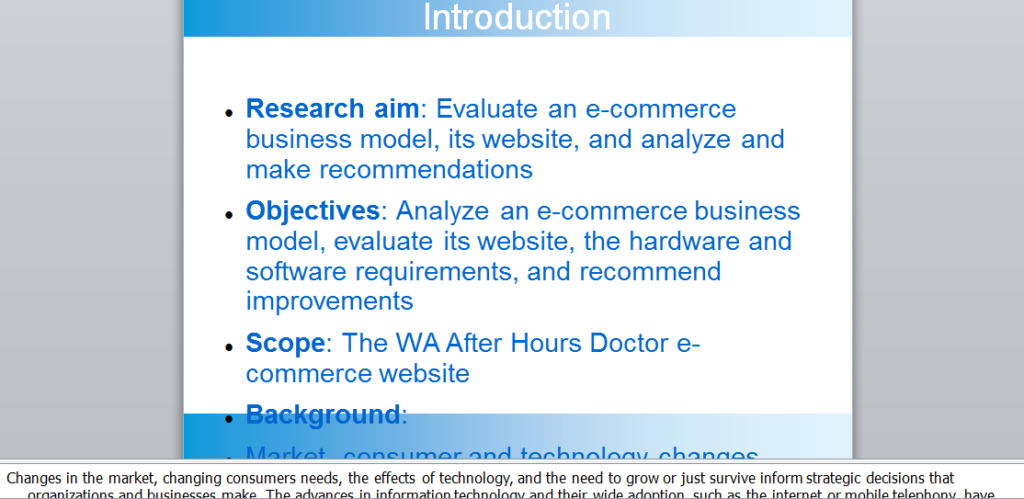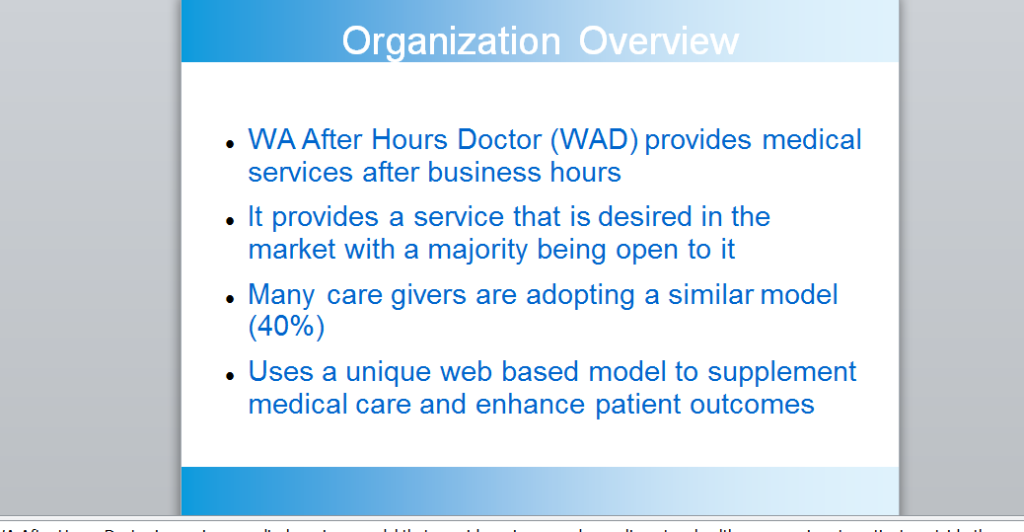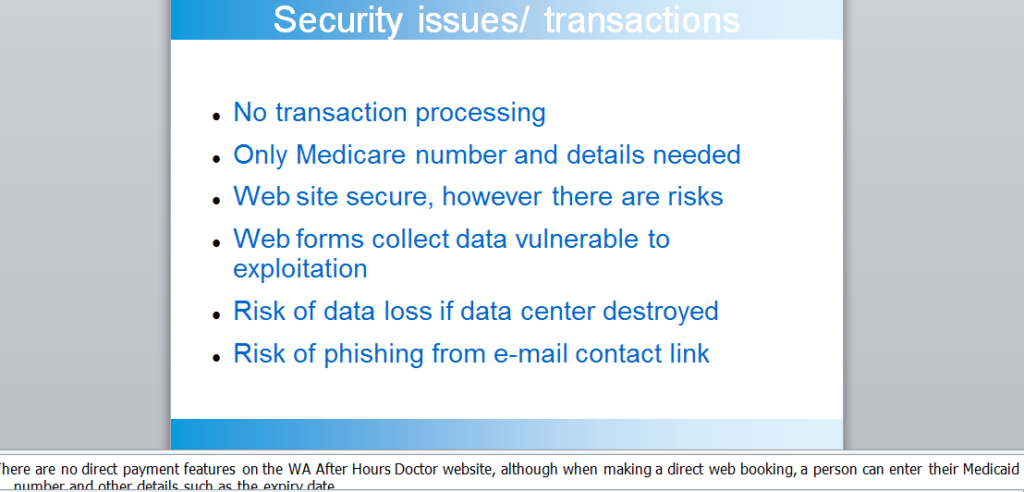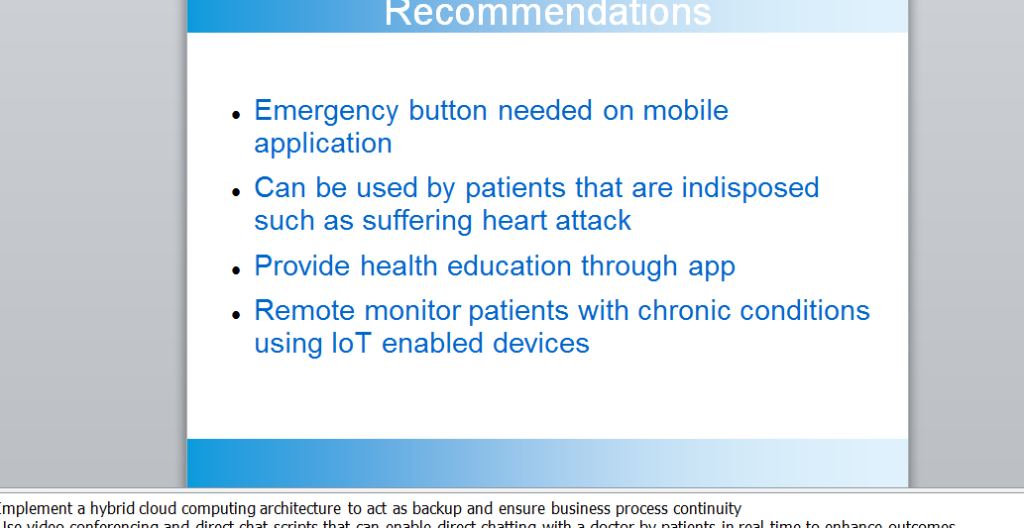ENTERPRISE SOCIAL NETWORKS: WA AFTER HOURS DOCTOR
Table of Contents
Introduction…………………………………………………………………………………………………………………………. 3
Aim……………………………………………………………………………………………………………………………….. 3
Objectives……………………………………………………………………………………………………………………….. 3
Scope……………………………………………………………………………………………………………………………… 3
Background…………………………………………………………………………………………………………………….. 3
Organization Overview………………………………………………………………………………………………………….. 4
Business Model……………………………………………………………………………………………………………………. 4
Website……………………………………………………………………………………………………………………………….. 5
Website Contents……………………………………………………………………………………………………………… 5
Hardware Infrastructure…………………………………………………………………………………………………….. 7
Software…………………………………………………………………………………………………………………………. 8
Security Issues…………………………………………………………………………………………………………………. 8
Payments/ Transactions……………………………………………………………………………………………………… 8
Discussion / Recommendations………………………………………………………………………………………………. 9
Conclusion………………………………………………………………………………………………………………………….. 9
Individual Contribution……………………………………………………………………………………………………….. 10
References…………………………………………………………………………………………………………………………. 11
Introduction
Changes in the market, changing consumers needs, the effects of technology, and the need to grow or just survive inform strategic decisions that organizations and businesses make. The advances in information technology and their wide adoption, such as the internet or mobile telephony, have heralded the adoption of new and innovative business strategies, driven largely by technology enabled information strategies. Businesses, therefore, develop technical strategies and plans that ensure they meet their objectives, meet or exceed consumer needs by leveraging existing technologies such as the Internet. This paper is a report that evaluates the information, business, and technical strategies of After Hours Doctors (available at http://www.waafterhoursdoctor.com.au/) in which the doctors and health-care personnel visit patients at their premises rather than the traditional approach where patients visit doctors or health-care facilities. The report is a synopsis of the collection and analysis of data concerning the business model and the hardware and software requirements for After Hours Doctor, an e-commerce business
Aim
This study aims at using a case study to understand e-commerce model and to evaluate of the e-commerce website. A detailed analysis is done and recommendations made on where improvements can be made (operational, functional, and security).
Objectives
Use a case study to analyze the e-commerce model for an identified business
Discuss the business organization, what it does, its operating model, and the services offered
To evaluate the e-commerce website, focusing on website contents, the hardware and software infrastructure, security issues, and transaction processing/ payment issues
To analyze the findings and make suitable recommendations and then present the research findings
Scope
This report involves a group work on the e-commerce business model offered by WA After Hours Doctor, an e-commerce based medical care business that provides primary and after primary medical care, delivery after primary care and the GP access schemes.
Background
Information pertains to a long-term strategy designed to help an organization achieve its goals and objectives in managing information, knowledge, or data. The information strategy is an outcome of an organizations’ strategic management, and constitutes an integral part of the organizations’ strategy. The business strategy of an organization refers to a set of competitive actions and moves used by a business to attract customers, strengthen performance, compete effectively in the market, and achieve its goals.
Organization Overview
WA After Hours Doctor is a unique medical services model that provides primary and complimentary health-care services to patients outside the regular medical hours, where patients normally visit doctors of health-care facilities. The business is an accredited medical deputising service. Research shows that a significant number of people that use primary health-care services would like to access their care givers after business hours, and that for 40% of patients, their care givers offered after hours medical care. The research findings show that this business model is highly desirable and its adoption by WA is a master stroke, especially given that they leverage technology with a web based application and mobile application business model (O’Malley, 2013). The business does not aim at replacing regular medical care, but to supplement it and provide patients with convenience and an option in the event of an emergency. For instance, an elderly person suffering asthma attack at night can just call for help through the web application or better still, through their mobile application, or by making a phone call to the service, and get emergency help (WA After Hours Doctor, 2019).
Business Model
WA After Hours Doctors (hereinafter referred to as WAD) is a medical service provider that uses the B2C (Business to Consumer)- e-Commerce business model. The B2C business model is one in which businesses sell products and services directly to the consumer and in the case of WAD, is conceptualized as an e-commerce website. The WAD mainly uses a subscription e-Commerce payment model where customers (patients) registered with medical insurance service providers such as Medicare, those registered with veteran Affairs, health care card holders, pension card holders, is registered as a member of WAD, are residents of Age care facilities, and those having private health insurance.
GP access scheme: The patient only needs to make a call and if is located in a covered region, or make a booking online or using their mobile application where they provide details of their condition and are then matched with the most suitable doctor/ GP. They then enter their details and register with the service of use their medical aid covers and can request for services through the mobile application. The care giver then visits the patient at home to provide the necessary medical services based on the details they provide. WAD sends a medical team with a doctor having a complete medical provision kit to the callers’ premises. The patients, can, if not covered or subscribed to any of the insurance of medical cover providers listed above, pay for services out of pocket.
The firm provides primary care services where people without critical conditions are treated, even though they do not need emergency treatment, but want immediate treatment to forestall any medical complications. After being treated by a WA After Hours Doctor at home, the patients medical records are shared with the patients’ regular GP within 24 hours and the patient can revert to getting regular services from their GP; as delivery after care. WAD also provides after care medical services delivery; when a patient has visited their GP and is unable to access them due to closure after usual business hours, on holidays, or weekends, WAD will provide after care services, such as providing additional medicine, treatment, ambulance services in case of an emergency, or augmenting care before the patient can see their GP.
Website
The WA After Hours Doctor uses a database driven website (found at http://www.waafterhoursdoctor.com.au/); the website is interactive and is designed to enable consumer input through the blog, directly on web page forms, or through face book social media platform
Website Contents
The service provider has a dynamic website that is data base driven and ha been designed consistently. The web interface is highly intuitive and very easy to use, even for an elderly person as the fonts are large enough to read without aid. The dynamic web interface means the content keeps changing and can be changed automatically from the database back-end. It has a few easy to understand tabs with just the necessary content being displayed as shown in Illustration 1 below;
At the home page, a visitor can select the ‘patient’ tab or find out the GP practices, visit the Blog, making an online booking, or contact the firm. There is also a ‘career’ tab for those looking for work or to provide a service. On each tab, there is an intuitive scroll-down menu from where a user can select several options. The web page is dominated by images and graphics that instantly gives a visitor an idea of what the firm is doing (products and services offered). The patient can make an online booking through the web site form (Illustration 2) and enter their details and book a service. Through the communication devices, the customer makes a booking to request home medical services; the process is easy, straightforward, and relatively short and simple; a patient makes a call after hours, is assigned a doctor, the doctor then visits the patients’ home and gives medical aid/ medication. The notes for the service are then sent to the patients’ regular GP and the end result is a patient that is feeling better. The services are billed in bulk and insured or those getting medial aid do not have to pay out-of pocket, except for patients without any insurance or medial cover.
Hardware Infrastructure
The e-commerce system functions based on the following hardware infrastructure;
Desktop, laptop, or tablet computers
Telephone with working line
Network cable system (wired and wireless) with routers
Servers and power backup systems tat make up the private data enter
Smart phones for installing the mobile application
Ambulance with medical service equipment
Doctors’ bag
Software
Supported web browser compatible with the web application model and has up to date Flash TM software.
Server software to run the database and application and web servers
Database software
Operating system for computers (Windows, Mac OS, and Linux)
Android and/or Apple MAC smart phone operating systems
Billing software
Electronic health Records Software
Security Issues
The web application takes in sensitive user data, such as patient records, their addresses, personal contact details, and insurance details (Medicaid). There is also an issue of data privacy in the context of Australian Data Privacy laws. Patients visit a website and provide their personal details as well as their medical insurance details, medical condition, and contact and residential addresses. While WA After Hours Doctor has no doubt done a lot to ensure a safe website, such as using the https protocol to ensure a secure connection, there are still security issues related to its use. The data collected using the web form is stored in a database and used by WAS after Hours Doctor staff, for instance, to review a patients’ symptoms, find out their location, and assign a suitable doctor. This data remains vulnerable to misuse especially for malicious purposes by internal staff that may steal, delete, modify, or expose the data to security breaches such as hacking. Acts of omission and commission by internal staff is responsible for some of the largest and most significant data breaches in an IT platform (Zhang, 2018). The security and privacy of user data depends solely on the privacy polices and security on the website, and has past events have shown, these are prone to being breached. The interactive website has an e-mail and direct contact from; a malicious user can send a worm through an e-mail inquiry and if security defenses are weak, suffer a significant attack, such as data theft or ransomware.
Payments/ Transactions
There are no direct payment features on the WA After Hours Doctor website, although when making a direct web booking, a person can enter their Medicaid number and other details such as the expiry date. Otherwise, WA After Hours Doctor does bulk billing for services rendered to customers/ patients, meaning there is little risk related to online payments. The firm thus uses a subscription payment model and in some cases, accept direct cash or other payments from customers.
Discussion / Recommendations
WAD is a medical services company that provides medical services to patients after hours through a web based application or through a mobile application. The model is unique and innovative, in line with client requirements as per research findings. The website is easy to use, learn, and highly intuitive, has secure connections for data input through the web forms, and is consistently designed. However, WAD can make some improvements on security and usability: The firm needs to ensure the website is fully encrypted and any data collected from the web forms is encrypted so that it remains safe in transit (during capture) and at rest (in storage). It should also implement a hybrid cloud computing architecture to act as backup and ensure business process continuity in case of a disaster and the website is unavailable. Users can only enter their details on web forms, send an e-mail, make a call, or use the mobile application: The firm can enhance the customer experience using modern communications technologies such as video conferencing and direct chat scripts that can enable direct chatting with a doctor by patients in real time; here the outcomes can greatly improve as the doctor can probe further and get more information from the patient to assign the most qualified staff and get the right medication based on accurate and informed diagnosis (Das et al., 2019). Further, the form can use AI (artificial intelligence) and ML (machine learning) to always provide services in addition to the FAQ (frequently asked questions). Further, the IoT (internet of Things) technology can be creatively applied by WAD by having patients with acute or critical conditions such as cardiovascular conditions, hypertension, diabetes, and those requiring physiotherapy being fitted with remote IoT enabled medical sensor devices (Istepanian and Al-Anzi, 2018). These will give doctors at WAD real time medical indicators and enable WAD to take initiative if a patients readings such as hypertension are critical and require urgent intervention even before patients can make a call. The mobile application should have a ‘panic’ button a patient in distress can press to get help; this will provide location and address details, for instance, in cases of an accident or a heart attack when the patient is highly indisposed (Knickerbocker et al., 2018).
Conclusion
WAD is an e-commerce medical service provider using the B2C business model with a subscription payment model. Services can be accessed online through the highly intuitive and easy to use web application, through e-mail, using a phone call, or through a down-loadable mobile application. One only needs a web browser (supported), a working phone, or a smart phone with supported mobile operating system to use the service. A computer, tablet, or ;laptop with internet access is required to access the service. The service is secure but given personal data is collected on the web or mobile interface, additional security measures are required, including encryption of when forms and collected data and cloud storage to act as a backup and ensure business process continuity. Recommendations include implementing AI and ML, having have chat or video conferencing features, and an automated ‘panic’ button non the application for patients in critical condition.
Individual Contribution
Undertaking this research was a team effort where every individual was assigned a main role, and after completing their tasks, all the material was discussed and synthesized to create this report. The individual contributions are outlined below;
| Individual | Role(s) | Comments |
| Acting as the team leader Researching organization and what it does; wrote introduction Creating the presentation Coordinating the task and activities program (meetings and tasks to be undertaken) | Done well | |
| Researching on the website; the website contents, hardware and software Record keeping and taking minutes of meetings and resolutions reached and documenting them | Done well | |
| Researching on the security, and transaction issues Discussion of findings Writing final report | Done well | |
| Making recommendations Creating the Power Point presentation | Done well |
All team member involved in making the final presentation for the project.
References
Das, A., Rad, P., Choo, K., Nouhi, B., Lish, J. and Martel, J. (2019). Distributed machine learning cloud teleophthalmology IoT for predicting AMD disease progression. Future Generation Computer Systems, 93, pp.486-498.
Istepanian, R. and Al-Anzi, T. (2018). m-Health 2.0: New perspectives on mobile health, machine learning and big data analytics. Methods, 151, pp.34-40.
Knickerbocker, J., Budd, R., Dang, B., Chen, Q., Colgan, E., Hung, L., Kumar, S., Lee, K., Lu, M., Nah, J., Narayanan, R., Sakuma, K., Siu, V. and Wen, B. (2018). Heterogeneous Integration Technology Demonstrations for Future Healthcare, IoT, and AI Computing Solutions. 2018 IEEE 68th Electronic Components and Technology Conference (ECTC), 1.
O’Malley, A. (2013). After-Hours Access To Primary Care Practices Linked With Lower Emergency Department Use And Less Unmet Medical Need. Health Affairs, 32(1), 175-183. doi: 10.1377/hlthaff.2012.0494
WA After Hours Doctor. (2019). Home Doctor – WA After Hours Doctor. Retrieved 14 September 2019, from http://www.waafterhoursdoctor.com.au/
Zhang, D. (2018). Big Data Security and Privacy Protection. Proceedings of the 8th International Conference on Management and Computer Science (ICMCS 2018).







